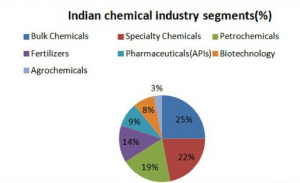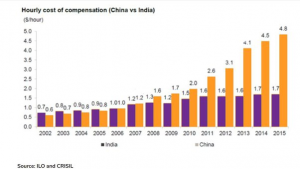A recent industrial profile states that India ranks sixth among leading global suppliers to the international speciality chemicals market with a 7% share of 2022 sales volumes and an annual growth rate of 4%. India’s essential role in the global economy is well known. Still, little-recognized is its importance as a provider of speciality chemical products, which are increasingly vital to a wide variety of industries.
India has been a leading world producer of spices, textiles and other speciality chemical products for centuries. Now, many of the same product lines are for export worldwide. India’s domestic market is not large enough to support specialization in these areas and therefore we see companies transforming themselves into global suppliers.
India has no major manufacturing base for speciality chemicals and the need to import major raw materials has been a problem since its independence. The chemicals industry is thus essentially a secondary industry. It is not the national government’s responsibility but the states’ responsibility to ensure its sustainability.
Visit this Page for More Information: Start a Business in Specialty Chemicals Manufacturing Industry
The Indian Chemical Industry is strategically tied to its foreign partners with respect to financing, technology transfer and R&D. This not only includes backward linkage with their suppliers but also forward linkage to their customers. The problem with this strategy is that it limits competition and therefore leads to higher prices. Another limitation is that it restricts the entry of new players into the market.
Standardisation of quality products is one of the major problems with chemicals being imported into India. Another problem being faced by Indian manufacturers is the lack of government support for indigenous speciality chemical industries.
Segments of the Chemical Industry in India:
The chemical industry can be broken down into five main categories.
Bulk chemicals: Bulk chemicals are large-scale chemical productions that can be further divided into organic, inorganic, and alkali chemicals.
Hydrocarbons: Hydrocarbons, which are derived from crude oil or natural gas, are one type of chemical compound that is used to make petrochemicals and polymers.
Fertilizers: These provide plants with the nutrition they need to grow. These can be divided into natural and synthetic and organic and inorganic categories. These can also be generically categorised as phosphate, potassium, and nitrogenous.
Speciality Chemicals: These are derived from fundamental chemicals and are produced for a particular use. These chemicals have high value, high R&D, and low volume properties.
Agrochemicals: These substances are used to protect crops from the many types of insects and pests listed above. These include, among others, fungicides, herbicides, and insecticides. These substances are used in irrigation water, seeds, soils, and agricultural crops.

These compounds are distinguished by their comparatively high-value, low-volume composition and focus on specific end-user applications that improve performance. These generically include colourants, water treatment chemicals, construction chemicals, paints and coatings, personal care components, and polymer additives.
According to the FICCI specialised chemicals research, speciality chemicals account for 22% of the global chemical sector and have a market value of US$35.9 billion. From FY19 to FY22, the demand for speciality chemicals is anticipated to increase at a CAGR of 12% to 14%. Investments in end-user industries like personal care, food and beverage, textiles, and packaging are a primary driver of the increasing demand.
When compared to basic chemicals, speciality chemicals provide solutions to customer applications that are knowledge-based and produce higher returns.
India’s Specialty Chemicals Sectors Have a Competitive Advantage
Read Similar Articles: Chemical Industry
India Benefits from China’s Chemical Sector Growth Is Stalled
Due to China’s tepid economic growth, which continued to be in a growth overhang, the domestic chemical sector is steadily slowing down. According to estimates, China’s GDP will increase by 6–6.5% in comparison to the 8–10% growth seen between 2009 and 2018–18. The following is a discussion of the main causes of a decline in the chemical sector.
The adverse global environment, including the U.S.-China trade war and the slowing of global growth, is a significant factor in China’s output growth.
Beginning in January 2015, the Chinese government tightened the requirements for environmental preservation. According to the Crisil study report, around 40% of the chemical manufacturing facilities experienced temporary closures due to safety inspections in 2017. In addition, almost 80,000 manufacturing facilities received fines for exceeding emission standards.
Click here to send your queries/Contact Us
To combat pollution, the Chinese government has mandated the construction of wastewater treatment facilities and imposed a green tax on the chemicals sector. Due to a scaled-up cost of production caused by capital expenditures incurred to develop these plants and an increased cost of compliance, this is likely to have an adverse effect on the margin.
Government regulations on emissions force businesses to limit their overall capacity. According to MC-chemicals’ assessment, there is a shortage of Maleic anhydride produced as a result of emission regulations and only 50–60% utilisation of the potential capacity.
By the end of 2020, the Chinese government has mandated that all small- to medium-sized chemical enterprises move their operations to specialised chemical parks that are far from habitat. Additionally, by 2025, all of the biggest plants must migrate.
Related Feasibility Study Reports: Pharmaceutical, Drugs, Fine Chemicals, Bulk Drug Intermediates, Pharmaceutical Drugs, Pharma Drug Ingredients Intermediates, Drug Intermediates, Speciality Chemicals, Raw Materials, Fine and Specialty Chemicals Intermediates, Pharmaceutical Bulk Drugs
Availability of Skilled Labour at a Reasonable Price
India has a cost-effective advantage over other countries in terms of skilled workforce. As a result, it has relatively cheaper operational costs and other cost components than its international competitors, particularly China. The cost of labour in China has been steadily on the rise. Between 2005 and 2015, China’s average labour cost increased at a CAGR of about 19–20%, compared to India’s CAGR of 4-5%. In fact, compared to India, this cost has more than doubled over the last five years, making Indian production somewhat more affordable.

Existence of Raw Materials
The organic value chain is supported by businesses like IOC, BPCL, BPCL, and Reliance, which are among the top suppliers of fundamental raw materials. On the other hand, basic inorganic chemicals like caustic soda, chlorine, and soda ash are readily available in significant quantities in India. Additionally, India benefits geographically by being close to Southeast Asia and the Middle East, where basic petrochemicals can be imported at a reasonable price.
Read our Books Here: Chemical Technology (Organic, Inorganic, Industrial), Fine Chemicals
Visit the page Select and Choose the Right Business Startup for You for sorting out the questions arising in your mind before starting any business and know which start-up you can plan.
We, at NPCS, endeavor to make business selection a simple and convenient step for any entrepreneur/startup. Our expert team, by capitalizing on its dexterity and decade’s long experience in the field, has created a list of profitable ventures for entrepreneurs who wish to diversify or venture. The list so mentioned is updated regularly to give you a regular dose of new emerging opportunities.
Push for Government Policies
To restrict the importation of inexpensive and subpar chemicals, the government has taken steps including requiring BIS-type certification for imported chemicals.
With the exception of some hazardous chemicals, the government has approved 100% FDI through the automated method in the chemicals sector. In order to support the sector’s expansion, the Indian government has created a draught National Chemical Policy with the goal of raising the sector’s GDP contribution to 6% within ten years. It has suggested a number of changes to the current legislation, including the MSIHC Rules and the Chemical Accidents (Emergency Planning, Preparedness, and Response) Rules being combined to simplify the law.
Niir Project Consultancy Services (NPCS) can provide project reports. The report covers – Manufacturing Plant, Detailed Project Report, Profile, Business Plan, Industry Trends, Market Research, Survey, Manufacturing Process, Machinery, Raw Materials, Feasibility Study, Investment Opportunities, Cost and Revenue, Plant Economics. The project report provided by NPCS gives a detailed market review. The report analyses the market confirms the availability of various necessities such as plant & machinery, raw materials and tells about the forecasting financial requirements. A lot of professionals have taken benefit from the project reports if you are interested in the manufacturing business, get in contact with us from the official website of NPCS.
Click here to send your queries/Contact Us
Reasons for Buying NIIR Report:
- Our research report helps you get a detailed picture of the industry by providing an overview of the industry along with the market structure and classification.
- Our report provides market analysis covering major growth driving factors for the industry, the latest market trends and the regulatory framework of the industry.
- Our Report provides an analysis and in-depth financial comparison of major Players / Competitors.
- Our Report provides indispensable buyers data with their company financials as well as the contact details, which can be an important tool in identifying the target customers.
- Our report provides forecasts of key parameters which help to anticipate the industry performance.
- We use reliable sources of information and databases. And information from such sources is processed by us and included in the report.
See More Links:
- Start a Business in Asia
- Start a Business in Potential Countries for Doing Business
- Best Industry for Doing Business
- Business Ideas with Low, Medium & High Investment
- Looking for Most Demandable Business Ideas for Startups
- Startup Consulting Services
- Start a Business in Africa
- Start a Business in India
- Start a Business in Middle East
- Related Videos
- Related Books
- Related Projects
- Related Market Research Reports
BA_20Art22





